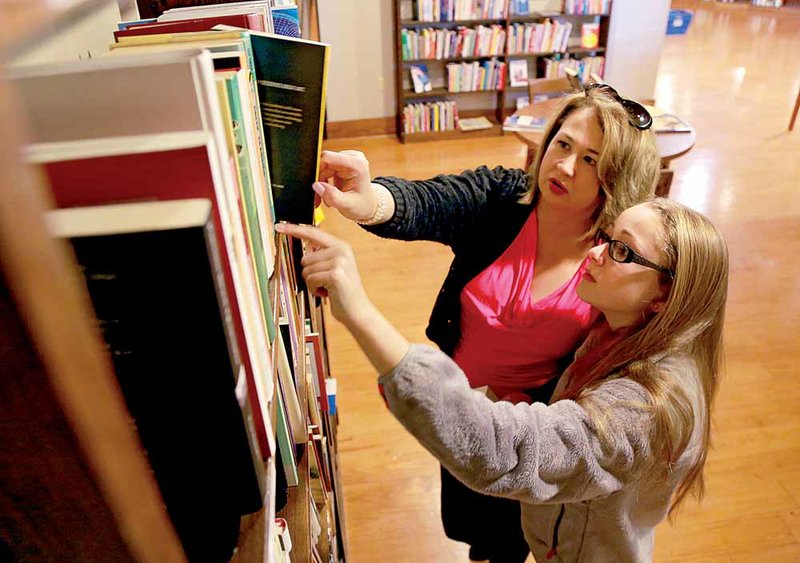LITTLE ROCK — Laura Loughridge remembers her 11th birthday for one important gift from her mother, a book of poetry. The book prompted her to read and write poems ever since, and she wanted to give her own daughter, Anna Woolfolk, 12, the same love of words.
“I think most people begin writing poetry as a way to express things they feel,” Loughridge says. As she kept writing, she found in poetry “a way to think outside the box.”
Anna runs on a whirligig schedule of school, church, basketball — “and I’m getting ready for track” — and hang time with friends who don’t relate so much to this one thing she likes, poetry.
“They’re not into it as much as I am,” Anna says. But she writes all she can.
“Usually, I do them [poems] on Sunday after church,” Anna says.
She starts in pencil, finishes on the computer, and her mom is the first reader.
“I’m always very pleased,” Loughridge says. Whatever else one of Anna’s poems might be, it’s a mother-daughter connection.
Mothers are famously soft on gifts from their children, and poets have been writing lines for and about their mothers for as long as pens have made marks on paper. Mothers know all about “stringing pretty words that make no sense,” the English poet Elizabeth Barrett Browning wrote: “And kissing full sense into empty words.”
The best of Anna’s poems advance to a tougher audience: judging in the junior division poetry contests that she enters through the Poets’ Roundtable of Arkansas.
To win a contest — and she has topped several — “is exciting and wonderful,” Anna says, “and it’s nice to know that my work means something.”
REFLECTIONS
One night, while watching television, Anna saw a car commercial with a forest setting that made her think of being outside in the rain. She wrote this poem, “Above Us”:
Above us are trees, and clouds dancing, in the moonlight. Below us, is grass shivering, in the cold. When the rain comes down in puddles, I see my reflection, above us.
Loughridge, too, is a prize winner in the poets group, in which she is president of the Little Rock branch, the River Market Poets. Also, she is the state organization’s youth chairman, her job being to encourage the next generation of poets in a world of texts, Tweets and iTunes.
“If you want to write well, you have to learn to read well,” she says. “I think we have less and less kids reading.”
In school, she says, “It’s hard to find that one teacher who is really interested in this kind of expression.”
Those concerns are raised, as well, among educators. Catherine Robson, writing in The Chronicle of Higher Education, looks back to a different time when school commonly required children to “stand up and recite a piece.” The practice might not have been good teaching, but it did result in the average American having at least one poem committed to memory.
Now, “poetry is a bit outside the mainstream,” Newbery Honor winner Joyce Sidman writes in the School Library Journal. “Many readers don’t seek it out,” she writes, “and some avoid it.”
But she sees in poetry’s “sculpture of words” a form that does wonders, especially for “nontraditional learners ... kids that don’t quite fit in ... Poetry gathers them up, gives them a fistful of words, and lets them sing.”
Loughridge suggests the roundtable as a source of encouragement and ways for poets to find readers. Adult and children’s contests are detailed on the association’s website, poetsroundtable. com.
MOTHER AND METER
Some contests offer cash prizes for the best poems. Thanks to one such award, Loughridge says, “I bought my husband a grill.”
But she writes for other reasons — to be a better writer, for one, and to write things she can’t say as well any other way.
A year ago, she thought of how quickly Anna seemed to be growing up, how busy with so many interests outside of home.
“I don’t have her full attention like I used to,” Loughridge says. And so, “inching toward the letting-go process,” she wrote a poem, “To My Daughter at Age 11”:
The gleam in your eyes gives you away as a dreamer. Stay that way. You cannot be all things to all people, but you can be all things to yourself.
Dancer Artist Gymnast Poet Singer Daughter Friend
There will be days, hard days, when you feel like giving up. Don’t. Storm clouds, heavy with rain, will gather. Shine. Animosity, hate, despair, and dejection will overwhelm. Believe.
Some day I will not be here. You will be in charge of making your mark on this world and making your dreams come true.
Never give up. The consequences will become shackled regrets. I should know.
Family, Pages 32 on 01/16/2013

